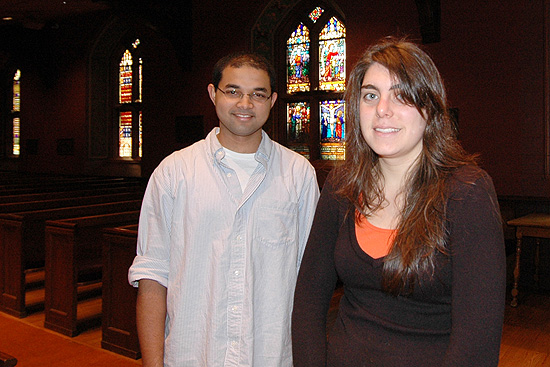Students Promote Campus-Wide Religious Pluralism
 |
| Nadeem Modan 10 and Adina Teibloom 10 attended interactive workshops, panel conversations with leading think tanks and foundations at the Interfaith Youth Conference Oct. 28-30 in Chicago, Ill. They are sharing what they have learned with their Wesleyan peers. |
| Posted 11/05/07 |
| Two Wesleyan sophomores met with renowned religious scholars, interfaith activists and peers from around the world recently to promote peaceful relations between different religious groups.
Nadeem Modan 10, who is Muslim, and Adina Teibloom 10, who is Jewish, attended interactive workshops, panel conversations with leading think tanks and foundations, and an interfaith concert at the Interfaith Youth Conference Oct. 28-30 in Chicago, Ill. This years conference was titled Crossing the Faith Line. Modan, an active member of Wesleyans Interfaith Justice League and the Advisory Committee for Spiritual and Religious Life, attended the conference to discover methods to encourage further religious pluralism at Wesleyan. Hes also striving to develop a Middle Eastern Studies Program at Wesleyan, where is planning to major in pre-med and religion. Many of us grapple with the same problems: How do we create a safe space in which people feel comfortable enough to share their beliefs? How do we guide a discussion in which authenticity is not lost while trying to maintain community? And how do we deal with the elephant in the corner that is the Middle East?, Modan says. By attending this conference, I was able to get answers to these questions, all of which will help in working towards religious pluralism on campus and beyond. Modan says Wesleyan, which prides itself on its diverse student body, often excludes religion as a form of diversity. “Unless you’re like me, unless you believe this, unless you don’t believe that, you are wrong. This attitude is still very prevalent at Wesleyan, and it is espoused not only by those who identify as religious, but arguably even more so by those who don’t, Modan says. At the conference, Modan and Teibloom had the opportunity to participate in dozens of workshops, led by spiritual leaders from around the country. Topics included Youth as Leaders in the Interfaith Movement; the Relevance of Religion in 21st Century Curriculum; Faith, Democracy, Jazz: The Applications of Universal Language Skills; Bahai Faith; Enhancing U.S. – Muslim Relations on Campus; Evangelical Christianity; Creating Interfaith Dialogue on College Campuses; Deepening Interfaith Service Learning Through the Arts; Addressing the Arab-Israeli Conflict in Interfaith Dialogue; Fostering Mentoring Communities Through Interfaith Service Learning; among many other topics. This was Teiblooms second year attending the interfaith conference. She has worked with the organization for five years, and was invited to facilitating a brainstorming session about how to be an effective interfaith leader on campus. She also wrote a pamphlet about the Days of Interfaith Youth Service, which was widely distributed. Teibloom, who is planning to major in religion, hopes to begin a summer program for students in high school and college to experience religious diversity and work together toward common action. She wants to pilot the program at Wesleyan. Our campus lends itself to interfaith work because it is an accepting environment to begin with, Teibloom says. I hope that an interfaith culture can be started on this campus and become a tradition that will continue even after I have graduated. If we can come to understand each other across difference perhaps we can begin to consider ending these conflicts with fair, peaceful solutions. Modan and Teibloom attended several talks by featured speakers such as Eboo Patel, founder of the Interfaith Youth Core; Umar Faruq Abd-Allah, chair and scholar-in-residence at the Nawawi Foundation; Sally Mahe, director of Organizational Development for the United Religions Initiative; Ji Hyang Sunim, Buddhist advisor at Wellesley College; Eliyahu McLean, director of Jerusalem Peacemakers; Sally Quinn, editor of the Washington Post; among others. Participants also attended a networking dinner, interfaith concert, a screening of Encounter Point, featuring a Q&A with director Ronit Avni of Just Vision; and the 2007 Days of Interfaith Youth Service Awards Banquet. I see religious pluralism as a way of life, Teibloom says. Its a place where everyone is constantly striving to understand and empathize with people of all different moral and religious traditions. For me, pluralism is more than the existence of diversity but the dedication to encounter it with openness and acceptance at every moment. |
| By Olivia Drake, Wesleyan Connection editor |

